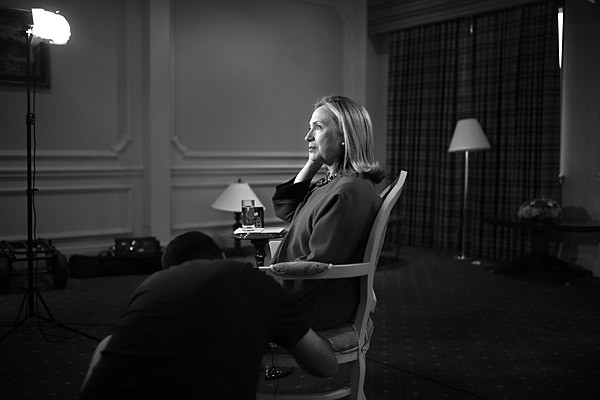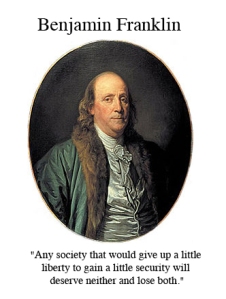Secretary of State Hillary Rodham Clinton on Wednesday suggested there was a link between the Qaeda franchise in North Africa and the attack at the American diplomatic mission in Benghazi, Libya, that killed the American ambassador and three others. She was the highest-ranking Obama administration official to publicly make the connection, and her comments intensified what is becoming a fiercely partisan fight over whether the attack could have been prevented.

Secretary of State Hillary Rodham Clinton meeting with President Mohamed Magariaf of Libya.
Mrs. Clinton did not offer any new evidence of a Qaeda link, and officials later said the question would be officially settled only after the F.B.I. completed a criminal inquiry, which could take months. But they said they had not ruled out the involvement of Al Qaeda in the Islamic Maghreb — an affiliate of the international terrorist group with origins in Algeria — in an attack the administration initially described as a spontaneous protest turned violent.
(…)
Mrs. Clinton made her remarks at a special United Nations meeting on the political and security crisis in the parts of North Africa known as the Maghreb and the Sahel, particularly in northern Mali, which has been overrun by Islamic extremists since a military coup helped lead to the division of that country this year.
Al Qaeda in the Islamic Maghreb has long operated in the region, she said, and was now exploiting a haven in Mali to export extremism and terrorist violence to neighbors like Libya.
“Now with a larger safe haven and increased freedom to maneuver, terrorists are seeking to extend their reach and their networks in multiple directions,” Mrs. Clinton told leaders assembled at the meeting, including President François Hollande of France and the United Nations secretary general, Ban Ki-moon. “And they are working with other violent extremists to undermine the democratic transitions under way in North Africa, as we tragically saw in Benghazi.”
Mr. Ban called the meeting to lay the groundwork for a possible international military intervention — to be led by African troops — to help the new military government in Mali re-establish control over a part of the country that Mr. Hollande noted was the size of France and is now under the grip of Islamist extremists imposing their vision of law and order.
“We cannot stand by and allow terrorists to take over an entire territory,” Mr. Hollande said.
Top militia leaders in Benghazi have dismissed the possibility that Al Qaeda in the Islamic Maghreb played a role in the attacks or had a foothold in eastern Libya. Benghazi residents have said they believe the brigade that conducted the attack could not have managed the assault on its own, because it included more than 100 heavily armed fighters.
Mrs. Clinton’s connection of the turmoil in the Sahel with the violence in Benghazi, which killed Ambassador J. Christopher Stevens, echoed remarks made last week by Matthew G. Olsen, the director of the National Counterterrorism Center. He said that intelligence analysts were investigating ties between local Libyan militias and Al Qaeda in the Islamic Maghreb, but had not yet come to any conclusions.
A senior administration official said that Mrs. Clinton intended to underscore the rising threat that the Qaeda affiliate and other extremist organizations pose to the emerging democratic governments in countries like Tunisia and Libya, adding that the group clearly intended to make contact with extremists in Benghazi and elsewhere. The final determination of the group’s role, the official said, would await the investigation by the F.B.I.
Mrs. Clinton has also ordered a review of diplomatic security that is being led by Thomas R. Pickering, a veteran diplomat and former undersecretary of state.
It was not clear whether Mrs. Clinton’s remarks foreshadowed any possible retaliation against those who carried out the attack, whether they operated in sympathy with, or on orders from, Al Qaeda leaders. But she reiterated the administration’s vow to bring those responsible to justice, telling the conference that American intelligence and law-enforcement agencies were working not only with Libya but with other nations in the region to investigate the attack.
The cooperation with other nations beyond Libya in the investigations also seemed to indicate that the attack’s planning and execution might have crossed international borders and not simply have been a local, spontaneous eruption of violence in response to an amateurish Internet video denigrating the Prophet Muhammad.
(…)
From the start, Libyan officials have sought to blame foreigners, even as they move to crack down on extremist militias that took part in the uprising against Col. Muammar el-Qaddafi last year and clearly had a role in the attack. Mr. Magariaf said at least 40 suspects had been questioned, but there was no definitive conclusion about those involved. “It was a preplanned act of terrorism directed against American citizens,” Mr. Magariaf said in remarks broadcast on NBC’s “Today” show Wednesday.
The White House press secretary, Jay Carney, defended the administration’s evolving version of events. “Over the course of the past two weeks, this administration has provided as much information as it has been able to,” Mr. Carney told reporters traveling on Air Force One to Ohio on Wednesday. “We made clear that our initial assessment and interim reports were based on information that was available at the time.”
Read the story in it’s entirety here: NYT


.jpg)





